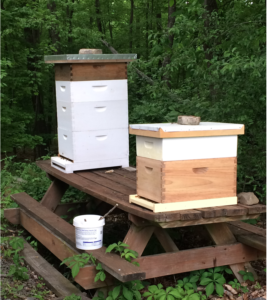Last year was my first year with bees and I certainly learned a lot. If it wasn’t for my bee club and for some bee friends I made there – I think I may have given all of this up within six months. But there is something addicting about beekeeping. It’s more of a science than a hobby, and the more you learn, the more you realize you don’t know.
So my first year went well…I think. I learned that one of the main purposes of the hive is to propagate – so every year they will try to grow big enough to send out a swarm and start a second colony. The problem with this is that if a beekeeper doesn’t catch that swarm, up to 80% of them don’t find a suitable home and they will die.
Right now that is pretty devastating to our environment and there are lots of steps being put into place to try to protect honeybees. Continue reading…


 I first thought about becoming a beekeeper after reading an article about how for the first time this year, the almond growers in California (who provide 80% of the world’s almonds) were struggling to find enough bees to pollinate the almond trees.
I first thought about becoming a beekeeper after reading an article about how for the first time this year, the almond growers in California (who provide 80% of the world’s almonds) were struggling to find enough bees to pollinate the almond trees.
Recent Comments